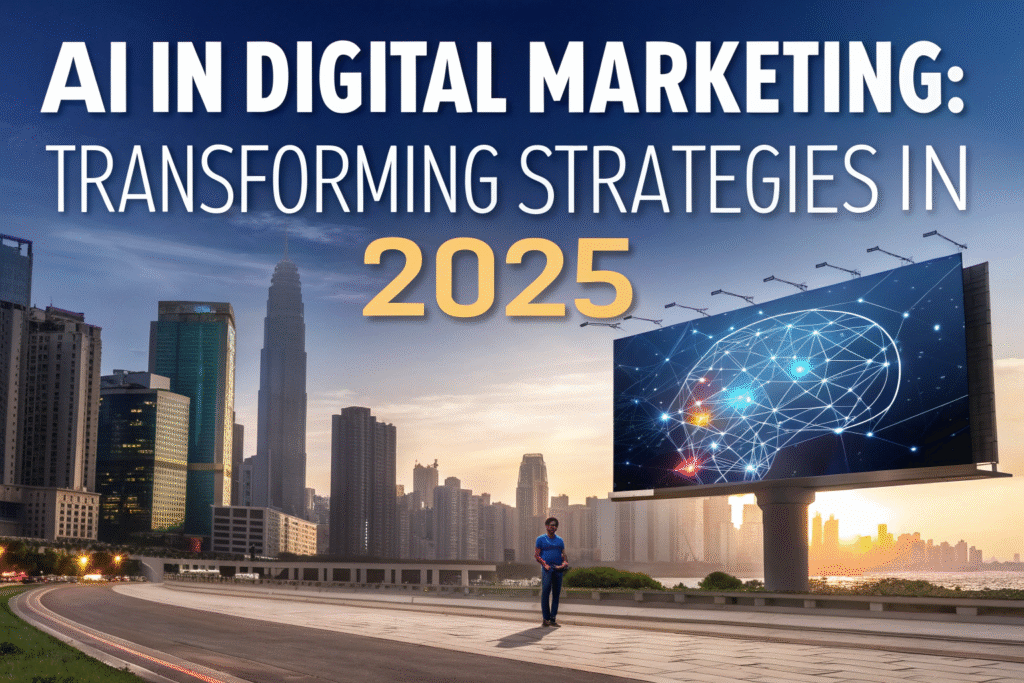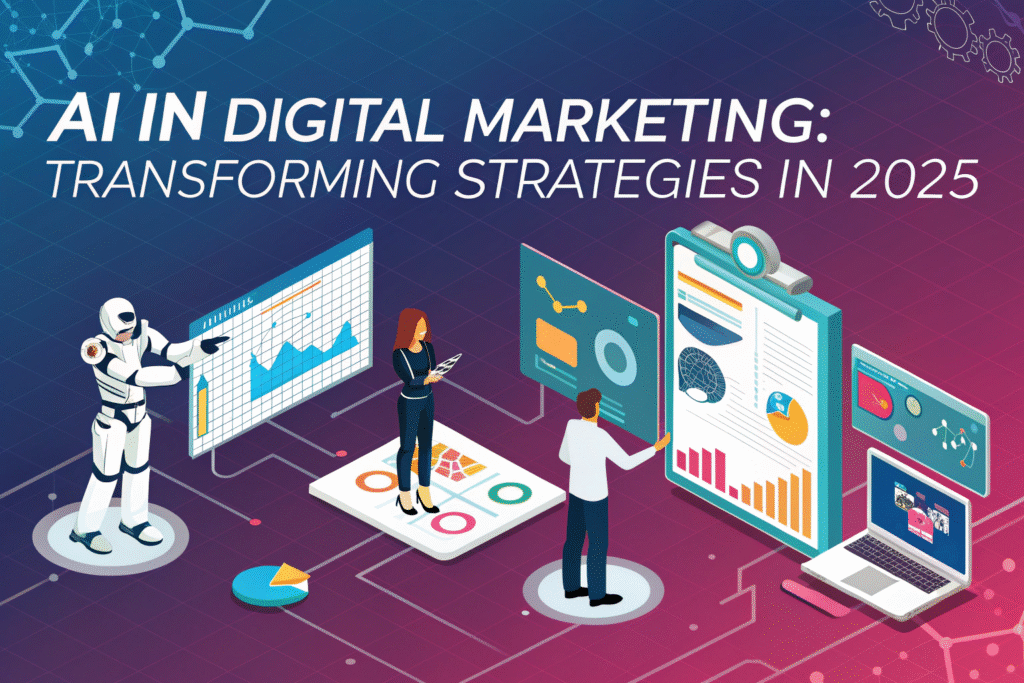
Introduction
Imagine a marketing tool that can predict customer behavior, write compelling ad copy, and personalize a user’s entire online journey—all in real-time. This isn’t a glimpse into a distant future; it’s the reality of AI in digital marketing today. Artificial Intelligence is no longer a niche concept reserved for tech giants. It has become an accessible, powerful force reshaping how businesses connect with their audiences, optimize campaigns, and drive growth.
For entrepreneurs, marketers, and content creators, understanding and leveraging AI is shifting from a competitive advantage to a fundamental necessity. This guide will demystify the role of AI in digital marketing, exploring its evolution, practical applications, and the immense potential it holds for your business.
A Brief History & Evolution of AI in Marketing
The journey of AI in digital marketing began with simple automation tools but has accelerated into a sophisticated ecosystem.
- Early 2000s: The Dawn of Automation. The first signs emerged with basic rule-based systems. Think of automated email responses and simple recommendation engines on e-commerce sites like Amazon. These were helpful but lacked true “intelligence.”
- 2010s: The Rise of Data and Machine Learning. With the explosion of big data, machine learning algorithms became capable of analyzing vast datasets to identify patterns. Platforms like Google and Facebook started using AI to optimize ad targeting and bidding, making campaigns more efficient.
- 2020s-Present: The Generative AI Revolution. We are now in the era of generative AI. Tools like ChatGPT, DALL-E, and Midjourney have burst onto the scene, enabling the creation of original text, images, and even video from simple prompts. This has democratized content creation and opened up unprecedented creative possibilities.
This evolution marks a shift from reactive automation to proactive, predictive, and creative assistance.
Who is Using AI? Audience & Demographics
AI tools are being adopted across the board, but their application varies by role:
- Entrepreneurs & Small Business Owners: They use AI to level the playing field, handling tasks like writing website copy, generating social media content, and conducting market research with limited resources.
- Content Marketers & Copywriters: AI acts as a powerful brainstorming partner, helping overcome writer’s block, generating outlines, and repurposing content across different formats and channels.
- SEO & PPC Specialists: These professionals rely heavily on AI for keyword research, forecasting ranking potential, optimizing bid strategies, and analyzing competitor backlink profiles.
- Social Media Managers: AI helps schedule posts at optimal times, suggest engaging captions, analyze sentiment in comments, and even generate visual assets for campaigns.
- Data Analysts: AI-powered analytics platforms can sift through complex data to uncover hidden insights about customer journeys, churn predictors, and campaign attribution.
Key Features & Functions of Marketing AI
Modern marketing AI platforms offer a suite of powerful functions. Here are the core capabilities:
- Predictive Analytics: By analyzing past behavior, AI algorithms can forecast future outcomes, for example, identifying which leads are most likely to convert and which customers may be at risk of churning. As a result, businesses can take proactive steps to optimize sales and retention strategies.
- Personalization Engines: These tools dynamically customize website content, product recommendations, and email messages for each individual user based on their real-time behavior and historical data.
- Natural Language Processing (NLP): This technology allows AI to understand, interpret, and generate human language. It powers chatbots, sentiment analysis, and content generation tools.
- Generative AI: Beyond analysis, AI can now create. This includes writing blog posts and ads, designing images, and composing video scripts.
- Programmatic Advertising: AI automates the buying and placement of ads, making real-time decisions about which ad to show to which user on which platform to maximize ROI.
The Business & Marketing Potential
Integrating AI into your marketing strategy unlocks significant benefits:
- Hyper-Efficiency and Cost Reduction: Automate repetitive tasks like data entry, reporting, and basic content creation, freeing your team to focus on high-level strategy and creative work.
- Enhanced Customer Experiences: Deliver 1:1 personalization at scale. AI can tailor the entire customer journey, from the first ad they see to the post-purchase follow-up, making interactions more relevant and engaging.
- Data-Driven Decision Making: Move beyond gut feelings. AI provides deep, actionable insights from your data, helping you understand what truly resonates with your audience and where to allocate your budget for the best results.
- Improved ROI on Ad Spend: AI optimizes campaigns in real-time, ensuring your advertising budget is spent on the most promising audiences and channels, thereby increasing conversion rates and lowering cost-per-acquisition.
Best Practices & Tips for Implementation
Getting started with AI doesn’t have to be daunting. Follow these best practices:
- Start with a Clear Goal: Don’t use AI for the sake of it. Identify a specific problem, such as “reduce time spent on social media content creation” or “improve email open rates.”
- Choose the Right Tools: Select tools that integrate seamlessly with your existing martech stack. Popular starting points include Jasper or Copy.ai for content, Grammarly for editing, and HubSpot or Marketo for CRM and automation.
- Focus on Quality Data: AI models are only as good as the data they’re trained on. Ensure your customer data is clean, well-organized, and comprehensive for the most accurate results.
- The Human-in-the-Loop Model: AI is an assistant, not a replacement. Always review, edit, and refine AI-generated content. Inject your brand’s unique voice, creativity, and strategic oversight.
- Prioritize Ethics and Transparency: Always be transparent when using AI, particularly in customer interactions. Moreover, ensure that your data collection and usage practices comply with regulations such as GDPR and CCPA. By doing so, you build trust with your audience while minimizing legal and reputational risks.
Challenges & Limitations to Consider
While powerful, AI is not a magic bullet. Acknowledge its current limitations:
- Lack of True Creativity and Emotion: AI can mimic patterns but lacks genuine human empathy, intuition, and the ability to understand nuanced cultural contexts. It can produce generic content without a human touch.
- Data Privacy and Bias Concerns: AI systems can perpetuate biases present in their training data. It’s crucial to audit outputs for fairness and accuracy. Data security remains a top priority.
- Initial Cost and Learning Curve: High-end enterprise AI platforms can be expensive. Additionally, teams need time to learn how to use these tools effectively and write high-quality prompts.
- Over-Reliance Risk: Relying solely on AI can lead to a homogenized brand voice and a disconnect from your audience. Strategic human judgment is irreplaceable.
The Future Outlook of AI in Marketing
The evolution of AI is far from over. Here’s what to expect next:
- Multimodal AI: Tools will seamlessly combine text, image, audio, and video generation, allowing for the creation of rich, integrated marketing assets from a single prompt.
- Hyper-Personalized Video: AI will enable the mass creation of personalized video messages for individual customers, revolutionizing email and social media marketing.
- AI-Powered Voice Search Optimization: As voice assistants become more prevalent, SEO strategies will evolve to focus on conversational queries and featured snippets.
- Predictive Customer Journey Mapping: AI will not just analyze past journeys but will predict future paths, allowing marketers to proactively engage customers with the right message at the right time.

Conclusion
The integration of AI in digital marketing is a transformative shift, offering unparalleled opportunities for efficiency, personalization, and growth. Consequently, it empowers marketers to move faster, smarter, and more creatively than ever before. However, success lies in a balanced partnership — by leveraging AI’s computational power while guiding it with human strategy, empathy, and ethical consideration. In addition, marketers must continuously monitor outcomes to ensure AI-driven decisions align with their brand values and audience expectations.
The future belongs to those who embrace this collaboration. Start small, experiment thoughtfully, and prepare to unlock the full potential of AI to propel your marketing efforts forward.